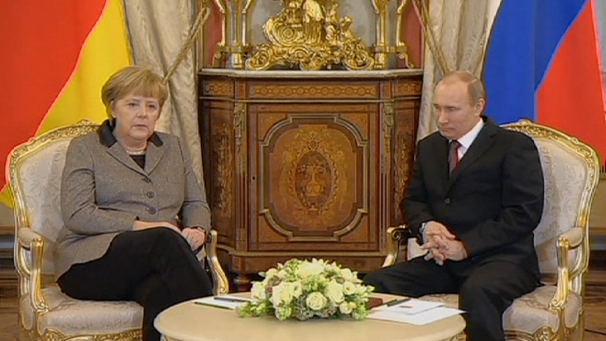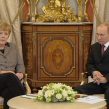
Setbacks and Squabbles in Russia’s Foreign Policy
Publication: Eurasia Daily Monitor Volume: 9 Issue: 212
By:

The Kremlin is moving from confusion to controversy in international affairs, a policy area which used to boost Russia’s “great power” status and bring joy to its leaders. Moscow cannot formulate a coherent position on the eruption of violence in the Gaza “black hole,” and the attempt of Foreign Minister Sergei Lavrov to explain Russia’s position on the Syrian civil war to the Gulf Cooperation Council was rebuffed so undiplomatically that he refused to stay for the scheduled dinner (Rossiyskaya Gazeta, November 16). Prime Minister Dmitry Medvedev sought to add a warm touch to his business-like visit to Finland on November 14–15 by bringing a kitten as a gift to former President Tarja Halonen, but the atmosphere was spoiled by the juridical ban on activities of the Russian Association of Indigenous Peoples of the North (RAIPON), which upset many Finnish activists (Kommersant, Novaya Gazeta, November 15). Meanwhile, President Vladimir Putin warmly greeted former French President Nicolas Sarkozy just outside Moscow, but this get-together only accentuated the public perception of an aging Kremlin court desperately clinging to power (Kommersant, November 15; Gazeta.ru, November 16).
The event that was supposed to erase these setbacks was the annual Russian-German Forum and the visit to Moscow of Chancellor Angela Merkel. So in the preparations, persistent signals about avoiding awkward issues had been sent (Nezavisimaya Gazeta, November 12). Merkel, nevertheless, did not shy away from expressing concerns about Russia’s retreat from European human rights norms that were spelled out in the unusually stern resolution approved by the German Bundestag (BFM.ru, November 16). How exactly she delivered the message in the 45-minute long tete-a-tete is any commentator’s guess, but in public she firmly dismissed the notion of “destructive criticism” and chided Putin for having too thin a skin for a public politician (Kommersant, November 17). Engaging in a counter-attack, Putin found no better argument than to accuse the imprisoned young women from the Pussy Riot punk rock group of anti-Semitism, which not only triggered an avalanche of ridicule in the blogosphere but also aggravated doubts of Putin’s sources of information and understanding of the drivers of deepening discontent (Moscow Echo, November 17; Forbes.ru, November 16).
It was a striking coincidence that on the same day that Merkel was bickering with Putin, The United States House of Representatives approved the so-called “Magnitsky Act” as part of a package of legislation that lifted the outdated Jackson-Vanik Amendment on trade with Russia. Consequently, a normalization of bilateral trade relations came together with sanctions targeting a list of corrupt Russian bureaucrats (Lenta.ru, November 14). Most opposition groups rejoiced at the strength of this vote “for Russia”—the US resolution passed with 365 votes against 43 “nays.” But the Russian foreign ministry responded with furious protestations and promised to take “adequate counter-measures” (Moscow Echo, Kommersant, November 17). These measures would hardly amount to much as most of the ways in which the Kremlin could shoot itself in the foot, like cancelling the Nunn-Lugar Cooperative Threat Reduction program, was done preemptively. President Barack Obama would probably want to carry into his second term the positive momentum of the “reset,” exhausted as it is, but he cannot fancy playing a “dove” to Frau Merkel’s “hawk.”
The main difference between Washington’s and Berlin’s search for a new pattern of doing business with Putin’s Russia is that the former is focused on arms control, where prospects are far from promising, while the latter is based on the shock-absorbing foundation of economic ties. The German business elite was able to persuade Chancellor Merkel to swallow her distaste for Putin’s quasi-democracy; but now German business’s own distaste for shameless corruption has become a potent political force. Germany’s entrepreneurs possess a sound insight into the root causes of the massive capital flight from Russia, which has prompted international investment funds to reduce their exposure (Gazeta.ru, November 16). They also understand the risks generated by social inequality, which in Russia has reached grotesque proportions—the top one percent of households owns 71 percent of the country’s total personal wealth (Ezhednevny Zhurnal, November 16). For most of the Putin “era,” the steady expansion of petro-revenues guaranteed the increase of incomes at the bottom of the social pyramid. But shifts in the global energy market have destroyed the sustainability of economic dirigisme and paternalism. Energy giant Gazprom, which used to be Putin’s political instrument of choice, is under pressure on its high-value European market, and the decision to go ahead with the construction of the hugely expensive South Stream gas pipeline across the Black Sea (secured by granting Bulgaria a 20-percent cut in the price of natural gas) makes for a bold departure from economic common sense (RBC Daily, November 16).
The erosion of energy power leaves Putin confused about how to lure Western investors in while at the same time keeping Western interferers out. And he is particularly concerned about the diminishing value of his patronage for the former and diminishing fear of his wrath among the latter. The Russian president’s way of restoring his own credibility amounts to unleashing targeted repressions against the opposition and disciplining the lieutenants with selective anti-corruption investigations. The “show trials,” punishing both rebels and rogues, have become so frequent that Putin found it appropriate to clarify at the joint press-conference with Merkel: “This is not 1937.” The courtiers may be happy to feel the firm hand (until some of them conclude that the head has lost touch with reality), but the opposition is not impressed; and several trouble-makers, including Boris Nemtsov, were lobbying the US Congress to pass the “Magnitsky Act” despite the raging anger in the Kremlin (Moscow Echo, November 17). The newly-elected Coordination Council of the allied opposition parties is working hard on preparing a new protest rally in Moscow on December 9, seeking to mobilize the discontent against the unjustifiable repressions.
Putin knows that his Western peers (as well as the new generation of Chinese leaders) will accept him “as an equal” only if he can demonstrate convincingly the efficiency of his personal control over the political turmoil in Russia. His problem is that while Merkel and Obama and Xi Jinping are searching for policies of managing change, his goal is to enforce a freeze. Regime survival is the absolute priority, and there is no way to make it compatible with the tasks of modernizing a country trapped in petro-populism. Every counterpart now looks at Putin with the “How long?” question in mind; and the answer is likely to arrive soon.




